#BUCPUA Professor reveals how to land the best job ever

On September 29, more than 250 policymakers and job seekers gathered at the 8th Annual Massachusetts Green Careers Conference, held at the DCU Center in Worcester. BU City Planning and Urban Affairs (BUCPUA) Adjunct Faculty Professor Eugene Benson, JD addressed the entire crowd and also led a smaller breakout session. Benson compelled the audience to pursue the best job ever – municipal conservation agent.
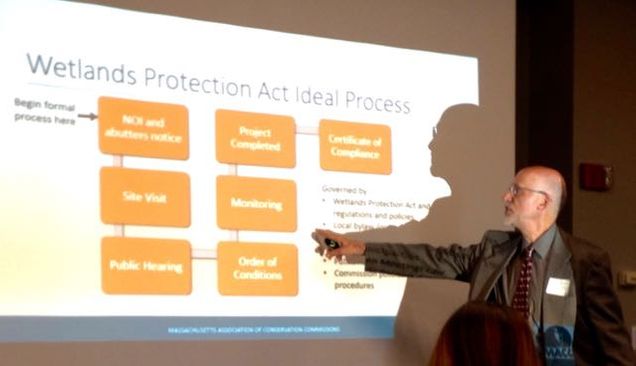
Passionate degree candidates in the #BUCPUA Program assess the social contexts and economic structures that influence the management of fragile open spaces, such as wetlands. The #BUCPUA Program provides students with high-demand tools and pertinent skills to excel as environmental planners. Relevant course offerings include UA 521 Environmental Law, UA 617 Applied Sustainability, UA 654 Geographic Information Systems for Planners, and UA 629 Urbanization and the Environment. Students can complement their Master of City Planning or Master of Urban Affairs degree with a Certificate of Applied Sustainability.
Aside from teaching law to #BUCPUA students, Benson is the Executive Director of the Massachusetts Association of Conversation Commissions (MACC). MACC’s tenants include advocacy, education, and conservation, and the state leader in providing education and training to more than 2,500 conservation commissioners. Benson urged participants to fully grasp the wetlands crisis in the United States, as half the country’s wetlands have disappeared since settlement by Europeans. This loss of wetlands has exacerbated flood conditions, particularly in states like Iowa, which has lost 80 percent of its wetlands. Wetlands perform invaluable functions by buffering floodwaters, capturing carbon, and providing habitats that sustain biodiversity.
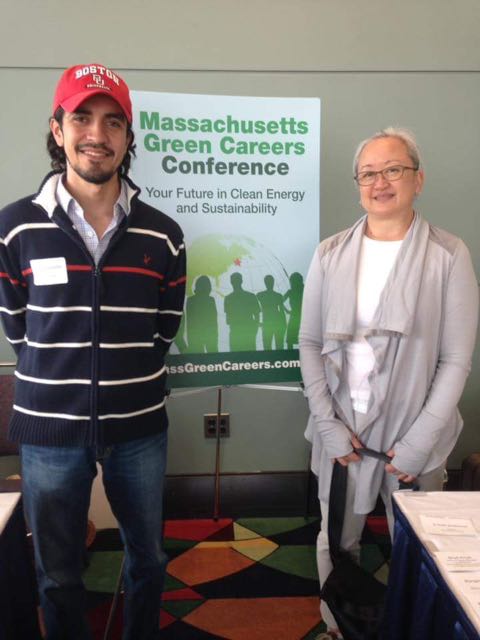
As municipal conservation agents, citizens have a direct stake over the protection and management of these vital, yet vulnerable, areas that envelop land, water, and biological resources. Conservation agents are full-time positions that support and guide all-volunteer municipal conservation commissions. On average, volunteer conservation commissions experience a 10 percent annual turnover, which underscores the value of a municipal conservation agent who can create a stable foundation for long-term planning and land management.
At the state level, the Massachusetts Department of Environmental Protection, the Massachusetts Department of Conservation and Recreation, and Massachusetts Regional Planning Agencies also offer full-time positions that directly influence the protection of open spaces. Qualifications required for state or municipal conservation agent positions include a thorough understanding of environmental law and superb communication skills that conform when influencing different stakeholder groups. Organization skills, creativity, and flexibility also help conservation agents preserve open spaces against myriad external factors, including impacts of climate change and ongoing economic development.
Aside from teaching law in the #BUCPUA Program, Professor Benson also instructs courses at the BU School of Public Health.

Dr. Dutta-Koehler featured at BU Conference on Sustainability Research
 The recent BU Conference on Sustainability Research featured Dr. Madhu C. Dutta-Koehler, Associate Professor of the Practice and Program Coordinator, City Planning and Urban Affairs. Dr. Dutta-Koehler participated in the Future Sustainability forum, describing her first-hand experience with smart growth, which has transformed the prospering Jamaica Plain neighborhood over the past ten years. The audience listened as she examined the outcomes of “smart growth” and its affect upon the human experience in Jamaica Plain.
The recent BU Conference on Sustainability Research featured Dr. Madhu C. Dutta-Koehler, Associate Professor of the Practice and Program Coordinator, City Planning and Urban Affairs. Dr. Dutta-Koehler participated in the Future Sustainability forum, describing her first-hand experience with smart growth, which has transformed the prospering Jamaica Plain neighborhood over the past ten years. The audience listened as she examined the outcomes of “smart growth” and its affect upon the human experience in Jamaica Plain.
Observational analysis supporting her concerns included a limited ability to see and feel the sky, shrinking capacity to park even one car near your residence, and a degraded Internet connection resulting from less-an-optimal internet infrastructure combined with increased density of users. In conclusion, Dr. Dutta-Koehler emphasized the ongoing role of vigilant, sustainable planning, especially upon areas seemingly experiencing successful smart growth.
The Conference was sponsored by the College of Arts and Sciences, the Department of Earth and Environment, the Pardee School of Global Studies, and the Institute for Sustainable Energy. Over 100 people attended the conference and its forums, including Measuring Sustainability, Modeling Sustainability, Human Dimensions of Sustainability, and Future Sustainability. The attendees were treated to a lunch and an evening reception during this one-day celebration and analysis of ground-breaking sustainability research.
Watch Dr. Dutta-Koehler's presentation (above), starting at the 2:22 mark.
- Courtney Thraen (MET'17)
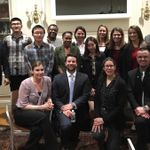
BUCPUA Boston Urban Symposium delivers its Imagine BU 2030 proposal to City leaders
On April 25, 2016, students participating in the Boston Urban Symposium capstone course (Urban Affairs 805) delivered their vision for Boston University in 2030. As an educational institution and the third largest employer in Boston, Boston University can leverage its planning and development potential through its own institutional master plan. By implementing this vision, the students demonstrated that BU can serve an institutional case model among the high density of educational and medical institutions in Boston.
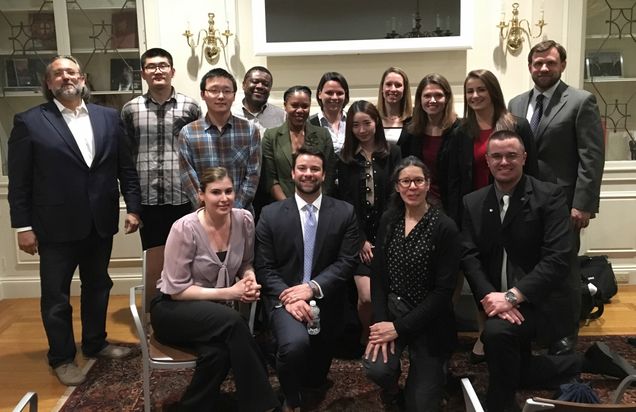
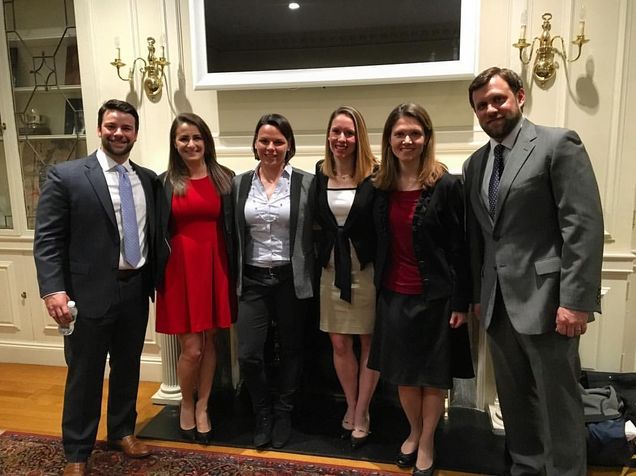
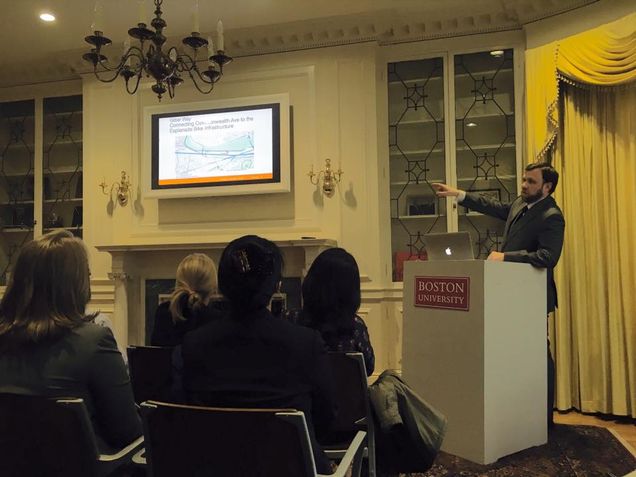
City leaders, field professionals, and the BUCPUA community listened to their proposals, which emphasized creating opportunities for BU employees to both live in Boston and efficiently use public transit. Specific proposals included developing mixed-use graduate and workforce housing upon under-utilized campus lots, along with targeting BU's brownstones solely for workforce and graduate housing. To achieve these housing proposals, the students recommended obtaining financing through tax-free bonds, developing public-private partnerships, and establishing non-profit management of BU's brownstones through a long-term master ground lease. Transit proposals included improved bike access from BU to the Charles River Esplanade along with coordinating the numerous shuttle services in the Boston area; these steps can align transit with the most prevalent travel patterns and overcome gaps in the MBTA subway system routes.
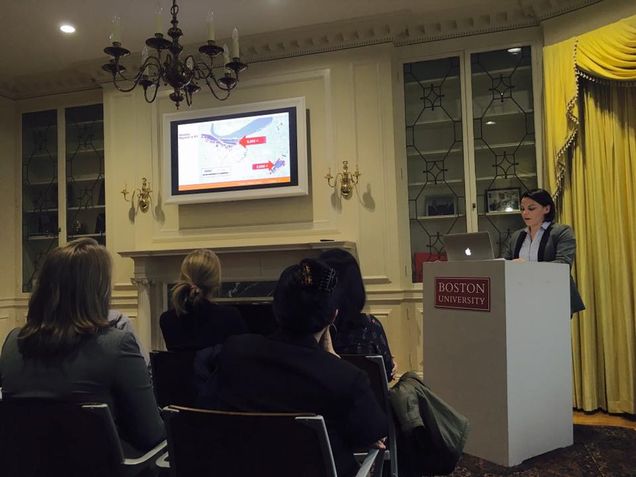
In conclusion, the inter-related nature of housing and transit, combined with the demand for workforce housing, requires action from not only the City, but also collaboration among its numerous educational and medical institutions. Therefore, the students asserted that an "Eds/Meds Consortium" in Boston could capitalize upon City-owned lots by partnering with non- profit housing developers and public-private developers to establish workforce housing. Furthermore, this "Eds/Meds Consortium" could monitor its workforce's travel needs and generate residents for newly established workforce housing.
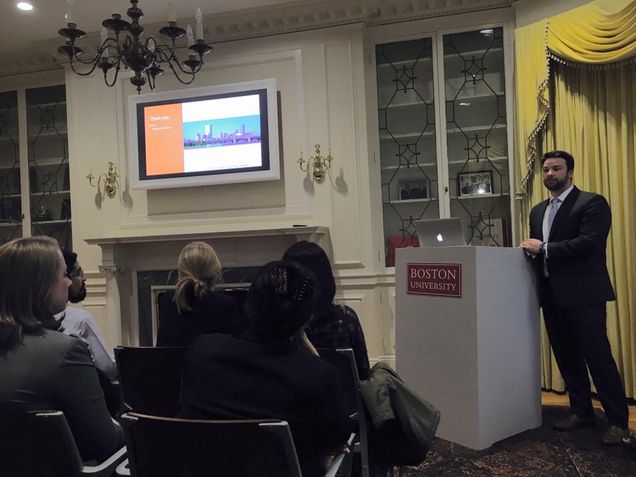
- Courtney Thraen (MET'17)
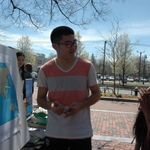
BUCPUA actionable sustainability team generates lasting buzz at BU Earth Day Festival
The 2016 BU Earth Day festival was blanketed by warm, spring air, but the BU City Planning and Urban Affairs (BUCPUA) sustainability team delivered in-depth context, strategies, and sustainability tips suitable for any season.
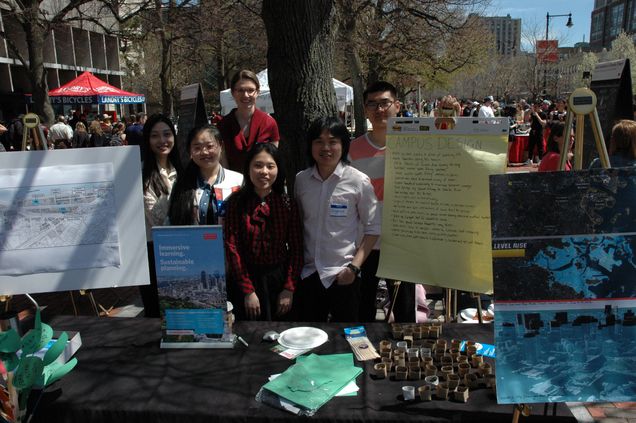
“I think it is important for BU to translate research findings into policy changes that can address climate change,” said Raymond Teoh, a graduate student in the MET city planning and urban affairs program.
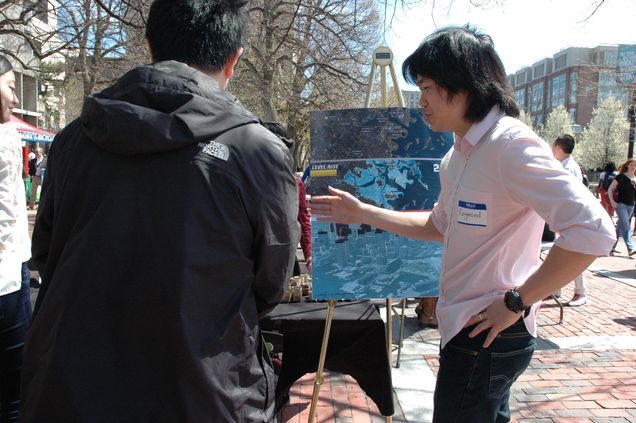
Spearheading the BUCPUA team were students enrolled in the MET Urban Affairs actionable sustainability course, which explored practical proposals for real world sustainability issues. Not only have these role models adopted sustainable actions into their daily routines, but they have also passionately championed sustainability outside the classroom.
On April 21, 2016, festival visitors were bombarded with an array of interactive sustainability demonstrations, all which reflected the Festival’s theme, ‘Local Solutions to Climate Change’. While Raymond Teoh (MET’17) illustrated the projected impact of sea level rise upon Boston in 2050, Zhaonan Wang (MET’17) and Vincent Lai (MET’18) prodded participants on their knowledge of climate change effects in Boston and around the world. Prizes included artful sustainability stickers and soybean plants encased in cardboard from toilet paper rolls.
Generating sustainability awareness amid the bustling 2016 BU Earth Day Festival was more than rewarding for the BUCPUA team, it was an opportunity to make a lasting impression through meaningful rapport and sustainability tactics. These students were exceedingly confident their impact would spread beyond campus to ultimately reinforce the City of Boston’s climate preparedness initiatives.
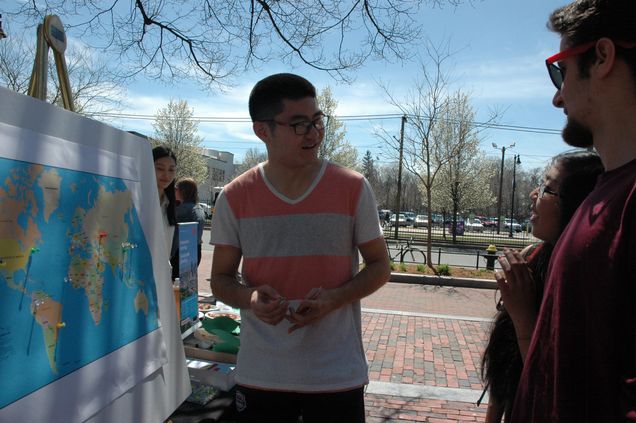
- Courtney Thraen (MET'17)
Dr. Dutta-Koehler moderates Urban Seminar at BU Initiative on Cities
 Momentum from the Imagine Boston 2030 (IB2030) planning process was heightened at Boston University’s Initiative on Cities Urban Seminar - Sharing Visions, Shaping Cities - held on April 4, 2016.
Momentum from the Imagine Boston 2030 (IB2030) planning process was heightened at Boston University’s Initiative on Cities Urban Seminar - Sharing Visions, Shaping Cities - held on April 4, 2016.
Madhu C. Dutta-Koehler, Associate Professor of the Practice and Program Coordinator, City Planning and Urban Affairs, Boston University, moderated a panel comprised of city leaders and field professionals who were gathered to unpack visions and develop measures to shape Boston in 2030. Panelists included Sara Myerson, Director of Planning, Boston Redevelopment Authority and Executive Director, Imagine Boston 2030; Matthew Littell, Principal at Utile; Renee Loth, Editor, ArchitectureBoston; and Rami el Samahy, Adjunct Professor of City Planning and Urban Affairs, Boston University, and Principal at over,under.
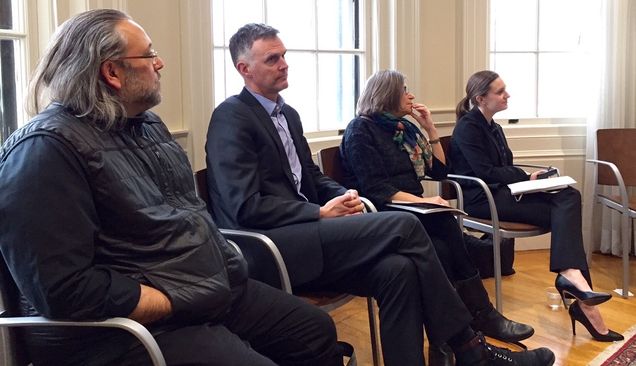
Panelists outlined factors critical to a successful city plan and discussed the principal goals and proper design of the plan. Common goals received through public engagement included better housing and transportation options and an improved education system. The Seminar explored how Boston’s continued population and job growth could actually help address these three major concerns.
"If we want to grow, we need to grow in those places in between neighborhoods, the railyards, and highways" said Littell.
Visions to improve transit, housing, education, and social inclusion will be placed into long-term strategies paired with specific action steps. Sara Myerson concluded that IB2030 will be a living document that will undergo continuous revisions and amendments over time to reflect the changing dynamics of the City.
MET Professor Addresses Climate Change and Megacities at Institute for Sustainable Energy
Dr. Madhu Dutta-Koehler
Boston University professors -- including City Planning & Urban Affairs' own Dr. Dutta-Koehler -- addressed climate change and environmental policy analysis through conversations of current and future research as part of the “Research on Tap” lecture series Thursday, March 3rd 2016 at the Rafik B. Hariri Building.
Peter Fox-Penner, a professor in the Questrom School of Business, and Gloria Waters, vice president and associate provost for research, hosted the sustainability symposium of 14 professors for a crowd of approximately 60 BU faculty members and students.
Read more about the event at The Daily Free Press.

Announcing: iBU2030

iBU2030
The city of Boston is creating its first city-wide comprehensive plan in more than 50 years. Dubbed Imagine Boston 2030, this master planning effort was kicked off in Fall 2015 with a two-year participatory planning process to solicit feedback from residents. Imagine Boston 2030 has asked Bostonians to engage in “visioning” discussions in order to identify the challenges and opportunities felt by those who live in Boston.
Boston University's City Planning & Urban Affairs (CPUA) program has answered this call through its own iBU2030 university-wide public engagement campaign initiated in Spring 2016. In partnership with the Initiative on Cities (IoC) and in collaboration with the Boston Urban Symposium capstone class -- led by Professor Rami El Samahy and guided by a panel of eminent urban experts* -- the Symposium students are focusing on Imagine Boston’s comprehensive plan by using Boston University as their focus. Boston University is the largest university system, the second largest employer, and an eminent educational and medical institution in a city known for leadership both fields; as such, it is as an important case study for the broader plan.
iBU2030 is a platform to seek feedback from the Boston University community of students, faculty and staff. The goal of iBU2030 is to explore how individuals affiliated with Boston University interact with the city by promoting discussion about how and why people live, work, play and learn in Boston.
Spearheaded by Jeannine Stover and Tess Kohanski - candidates for the Master of City Planning - iBU2030 seeks feedback to understand the challenges and prioritize the needs of different BU stakeholders in relation to the City’s Imagine Boston 2030 efforts. Upon the project’s completion, the findings will be presented to Imagine Boston 2030.
This engagement campaign will be active through spring and summer of 2016 and will include a series of focus groups, visioning charrettes, and online surveys. Participants will be asked questions such as: What do you feel are some potential barriers to attracting young professionals to Boston to work, live, play, or learn? From your perspective, what steps could Boston take to attract more students or young workers seeking educational, social, cultural, and employment opportunities?
This project will culminate in October 2016 with a final charrette and a presentation of the campaign findings to date. Community members from across BU will have a chance to participate in the final charrette and comment on the ideas presented. In addition to soliciting feedback and disseminating findings, iBU2030 will encourage and empower a unified BU voice and will allow the community to become a major player in the comprehensive planning effort.
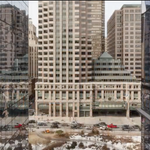
Announcing: New #BUCPUA Website
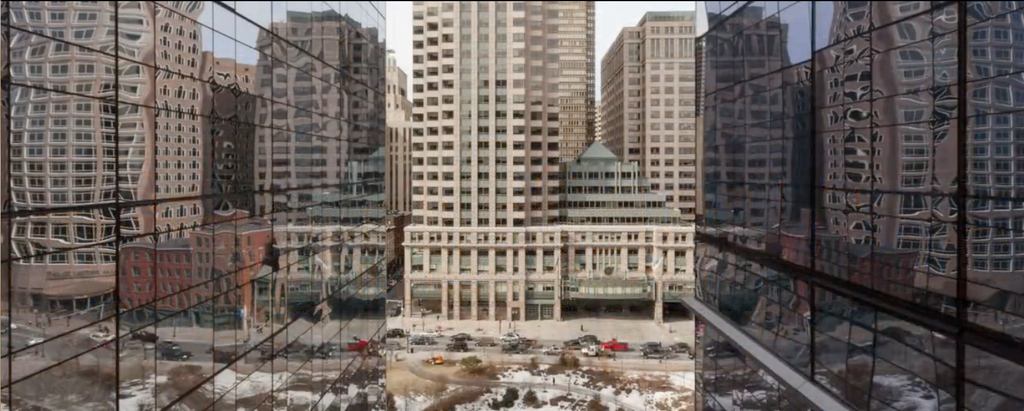
We’re pleased to announce that our new website 1.0 is live! After over a year of planning and collaboration with MET Marketing, we are pleased to offer an updated, high quality online resource for current and prospective members of the #BUCPUA community. The new layout has been designed to optimize ease of navigation, improve access to information about the program, and keep everyone up to date on current news and events. It is our hope that the quality of the site now reflects the caliber of the education offered through the program. We hope that you enjoy exploring our new site and recommend that you take a look at our updated Faculty Profiles to see the latest in their work, the student association for ways to be involved, and the student resources to review some of the benefits and opportunities available to students in the #BUCPUA program.
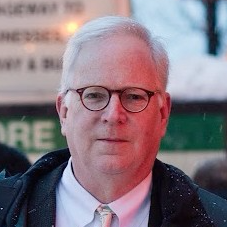
Beyond the Classroom: Terry Regan
By Mark Begley on 3/3/2016
Professor Terrance J. Regan has been a faculty member in the City Planning & Urban Affairs program since 2007. His expertise lies in transportation policy, finance, and intelligent transportation systems. In addition to teaching, Professor Regan is also a Program Manager with the US Department of Transportation’s (USDOT) Volpe Center. Interview conducted by Mark Begley.
------
Mark: Throughout your time with the City Planning & Urban Affairs Program, you have consistently been reviewed highly by your students. Can you speak a bit about your teaching style and what you like about the Program?
Terry: The best part about teaching is that it keeps me fresh within my own field. Trying to explain topics to your students, you really need to make sure you know what you’re talking about. It’s wonderful to have students question what you’re doing. I find myself having to pay more attention to different aspects of the transportation field so that I can convey that information to the students.
Mark: In addition to teaching, you’re also an expert in your professional field as a Program Manager for the DOT and have published works. How do you feel your work dovetails into your teaching?
Terry: In my teaching I try to bring in as much real world experience as possible. We use actual numbers such as MBTA ridership and finances, so a lot of coursework stems from real examples in the field of transportation. Right now I focus mainly on transportation planning, innovation finance, and urban freight. Urban freight is really about the first and last mile of delivery; if you look at NYC, there has been a 30% increase in home truck deliveries as a result of services like Amazon. No one likes trucks, except when they’re delivering a package to them. As we make roads more narrow and pedestrian- and bike-friendly, we need to also think about how to incorporate the needs of urban freight deliveries. Professionally, I’m working with contacts in Europe to see how we can design a better truck that can operate in congested urban environments. One example is to make the driver side door clear plastic or glass to improve visibility and therefore safety.
Mark: You have a reputation for going above and beyond, acting as a mentor and guiding your students by making connections and helping them get internships. What is it about your students that makes you want to do all this?
Terry: If I can place bright students in different jobs, it makes me happy. It helps them, it helps improve the field, and it helps me. I’ve been able to go back to some of them who have been in their jobs for a few years and get information and data from them. That alone benefits the program, and if I help them, they’ll help someone else down the line too. Tiana Alves is a great example of one of our recent graduates who we hired as an intern last summer and is now a full time federal staff member.
------
You can read more about Professor Regan’s background here, and see his thoughts about public transit and the Green Line as by covered in BU Today.
MET’s Urban Design Expert Weighs in on Climate Change Panel

While climate change presents challenges to all walks of life, it uniquely affects those areas that are most densely populated, which is why organizers of a BU Climate Change Adaptation & Mitigation Forum invited MET City Planning and Urban Affairs program coordinator and professor Madhu Dutta-Koehler to share her views on the power of urban design in adapting to, and combating against, rising global warming issues.
Watch Dr. Dutta-Koehler’s lecture, along with the rest of the panel, at BUniverse.
Heroic: Boston’s Urban Renewal
Lecture by Mark Pasnik, AIA, LEED AP
BUCPUA Advisory Board Member
March 22, 2016
6:30-8:00 p.m.
Rm. KCB-101, Kenmore Classroom Building
565 Commonwealth Ave
Boston, MA 02215
Open to all faculty, students, alumni + friends
Mark Pasnik, AIA, LEED AP, will present on the historical context, buildings, and architects that defined Boston during the radical transformation of the 1960s. Pasnik offers a compelling view on the story of Boston as it underwent controversial urban renewal programs and monumental architecture works to change into a modern, thriving city.
More information about Mark Pasnik may be found here.
More information about Heroic may be found here.